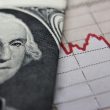Email this article | Print this article
This article is a guest contribution from David Rosenberg, Chief Market Economist, Gluskin Sheff, "Breakfast with Dave", May 12, 2010.
Bazooka Bust
It was almost comical to read this headline yesterday on page 2 of the FT — Blast of Relief as Bazooka Finds its Target. The word “bazooka”, in this context, was coined by former Treasury Secretary Hank Paulson back on July 15, 2008 to describe his weaponry to safeguard Fannie and Freddie. The stock market rallied that day by over 1%, to 1,215 on the S&P 500, and the short-covering rally took the index above 1,300 by early August. Little did anyone know that we had almost 50% to go on the downside before the interim lows were turned in. Beware of bazookas; they don’t always work.
Speaking of the GSEs, it really is so encouraging to see that a week after Freddie went cap-in-hand to the Treasury for a $10.6 billion cash infusion, Fannie had to go begging for $8.4 billion to cover its burgeoning losses. These two wards of the state have now drained $148bln of aid out of taxpayer pocketbooks since the mid-2008 bailout (the size of the entire deficit before the recession began).
And what a housing mess it still is — Fannie reported that its delinquency rate still rose to 5.47% in Q1 from 5.38% the quarter before. What is happening now is that a growing number of people who can in fact pay their mortgage have stopped making their payments out of “anger” — according to a disturbing article that showed up on page A4 of yesterday’s WSJ (Emotion Drives Many Defaults).
Why it’s disturbing is that it cites research showing that 12% of mortgage defaults are now “strategic” and that somehow this is now okay on our increasingly hedonistic society. In fact, a law professor is quoted as lamenting why people are “throwing their money away on a home in which they may never have equity.” Wow. Look how far we have progressed. We used to be told “why throw your money away on rent? Why don't you own?” Now it’s “why throw your money away on a house?" Maybe because you signed a contract — now why should that matter.
You really can’t make this stuff up.
Gold Glitters
In the aftermath of the Lehman collapse, gold faltered as there was a huge margin call everywhere and investors seeking liquidity sold off their winners. The secular bull market for bullion did not end at the time, no long-term trendline was violated, and gold did rise in non-U.S. dollars and far outperformed other currencies. But what happened during this recent round of intense European-led volatility and financial market weakness was that gold rallied even in U.S. dollar terms, which is significant seeing as there were large-scale safe-haven inflows into greenbacks. So this time, gold has managed to hit new highs in all currencies, and gold rallied even with the overall commodity complex slipping noticeably over the past few weeks.
This is a sign. Of what, you may ask? That gold is no longer trading just as part of the resource sector but is now taking on the characteristics of a currency. While the U.S. dollar has gained ground since late last year, there is no doubt that an Administration that has a stated policy of doubling exports in the next five years to “support” two million jobs absolutely craves a depreciating greenback.
[hana-code-insert name='BMO-Jr Gold' /]Meanwhile, a new socialist government in Japan wants a weaker yen. Sterling has only one way to go in an environment of heightened political uncertainty and a balance sheet that is at least as extended as Greece. And the ECB just gave notice with its agreement to buy sovereign and corporate debt that it is willing to distort the pricing of risk in the bond market for the greater good of helping profligate countries to avoid either defaulting or certainly help them finance their obligations at a subsidized cost. The Bundesbank, this is not.
So gold is no government’s liability and the shape and shift in its supply curve is the shape would seem to be a little easier to make out than fiat currency. We may end up being overly conservative on our peak gold price forecast of $3,000 an ounce.
To continue reading, go here. (Registration required)
Copyright (c) 2010 Gluskin Sheff








